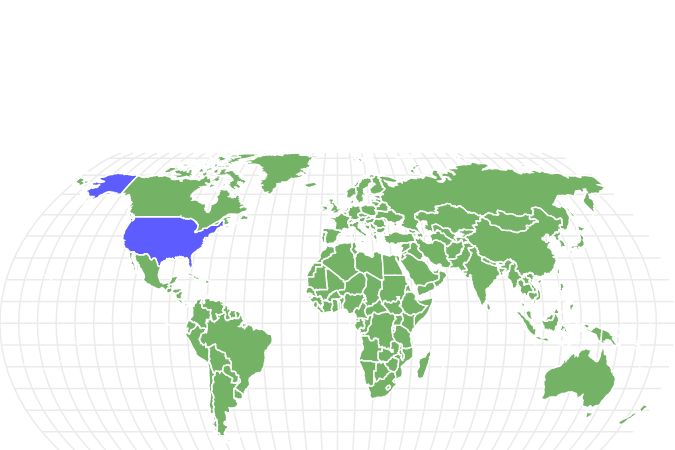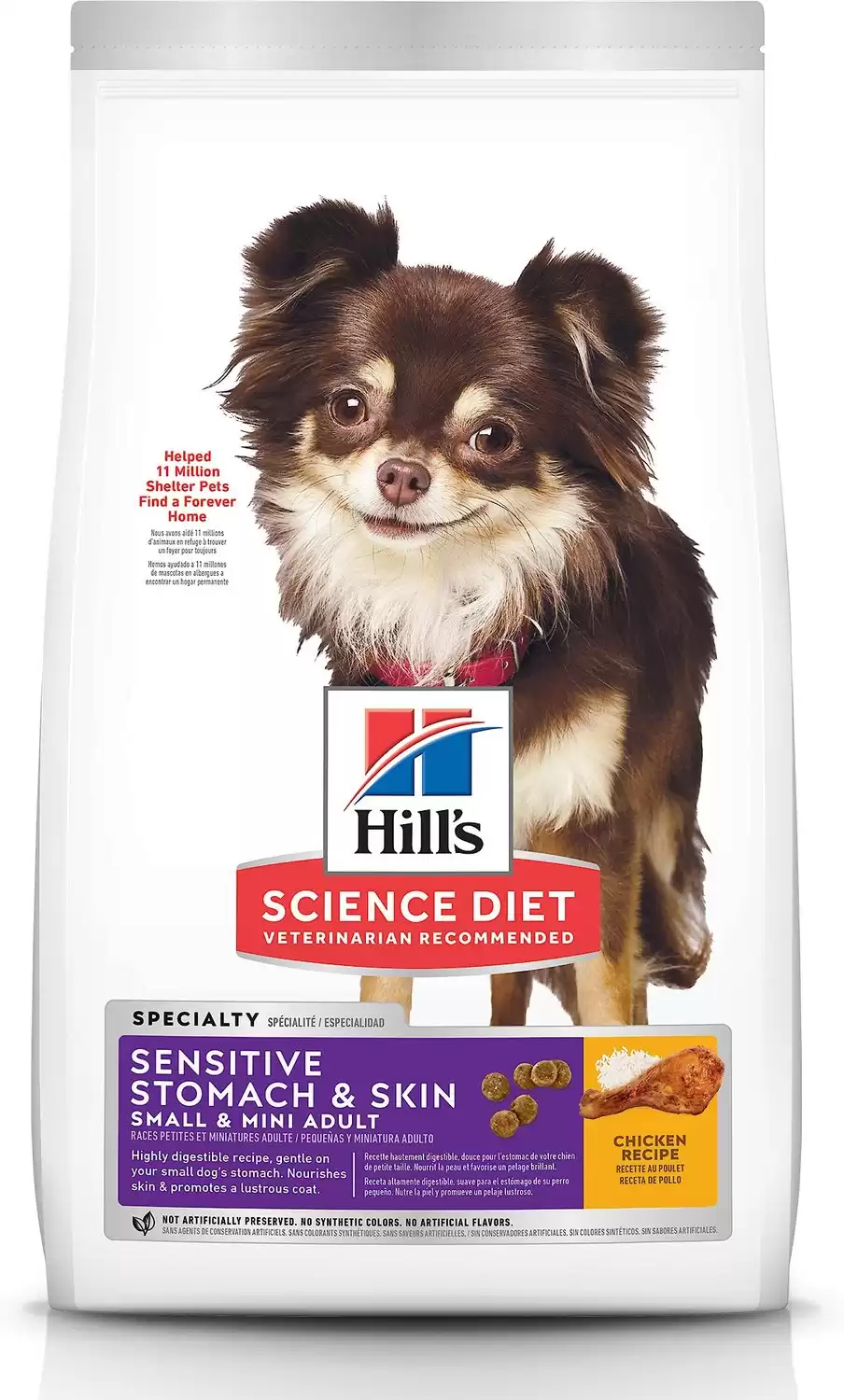Zuchon
Canis lupus
The breed often changes colors throughout its life, with its puppy coat becoming lighter over the first few years of life, then darkening as he ages.
Advertisement
Zuchon Scientific Classification
- Kingdom
- Animalia
- Phylum
- Chordata
- Class
- Mammalia
- Order
- Carnivora
- Family
- Canidae
- Genus
- Canis
- Scientific Name
- Canis lupus
Read our Complete Guide to Classification of Animals.
Zuchon Conservation Status
Zuchon Facts
- Name Of Young
- puppy
- Fun Fact
- The breed often changes colors throughout its life, with its puppy coat becoming lighter over the first few years of life, then darkening as he ages.
- Most Distinctive Feature
- teddy bear like appearance
- Other Name(s)
- teddy bear dog
Zuchon as a Pet:
- General Health
- Energy Level
- Shedability
- Trainability
- Intelligence
- Tendency to Chew
- Size
- Family and kid friendliness
- Yappiness / Barking
- Moderate
- Hypoallergenic
- Yes
- Separation Anxiety
- High
- Preferred Temperature
- Average climate
- Exercise Needs
- Moderate
- Friendly With Other Dogs
- High
- Pure bred cost to own
- $650-$1,000
- Dog group
- Sporting
- Male weight
- - lbs
- Female weight
- - lbs
This post may contain affiliate links to our partners like Chewy, Amazon, and others. Purchasing through these helps us further the A-Z Animals mission to educate about the world's species.
View all of the Zuchon images!
The Zuchon breed often changes colors throughout its life, with the puppy coat becoming lighter over the first few years of life, then it darkens with age.
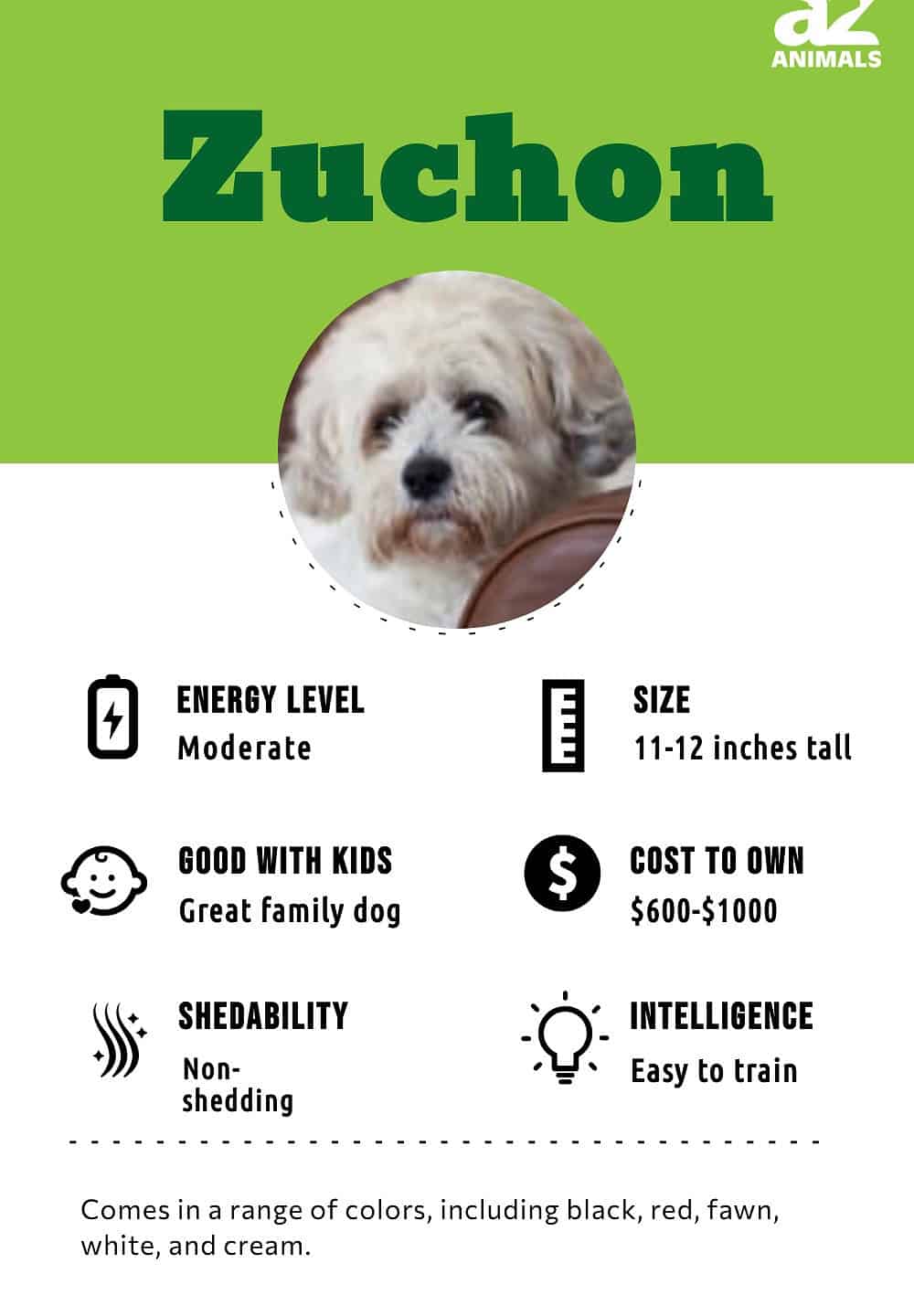
A sweet, loving breed, the Zuchon is a mix between the Shih Tzu and Bichon Frise. The goal was to breed an affectionate companion that has the best traits of each breed. The resulting Zuchon dog, also known as the teddy bear dog because of its appearance, makes a wonderful pet and, with the right training, an amazing service animal.
See all of our expert product reviews.
The Shih Tzu is an ancient breed, dating back 1,000 years and thought to have originated in Tibet. It was bred to be a docile companion dog.
Bichons are of French and Spanish descent. The Spanish originally used them as sailing and herding dogs. However, the French ultimately bred them to be noble lapdogs. In later years, they were sometimes used in the circus for their ability to walk on their hind legs and perform other tricks. Many of these dogs also enjoy dressing up and being the life of the party.
3 pros and cons of ownership
| Pros! | Cons! |
|---|---|
| Cheerful personality | Can be stubborn |
| Long lifespan | May be difficult to housetrain |
| Non-Shedding | Require daily grooming |

©iStock.com/Petra Richli
Size and Weight
A full-grown Zuchon should be compact and sturdy. The male and female are similar in height and weight.
| Weight (Male:) | 15 pounds |
| Weight (Female): | 14 pounds |
| Height (Male): | 12 inches |
| Height (Male): | 11 inches |
Common Health Issues
There are a few health issues to which the Zuchon is prone. Like the Shih Tzu, it may develop brachycephalic airway syndrome. Like the Bichon side of the family tree, it may be prone to atopic dermatitis. Other health concerns for the breed include:
Health and Entertainment for your Zuchon
See all of our expert product reviews.
- Cushing’s disease
- Patellar luxation
- Keratoconjunctivitis sicca
Temperament
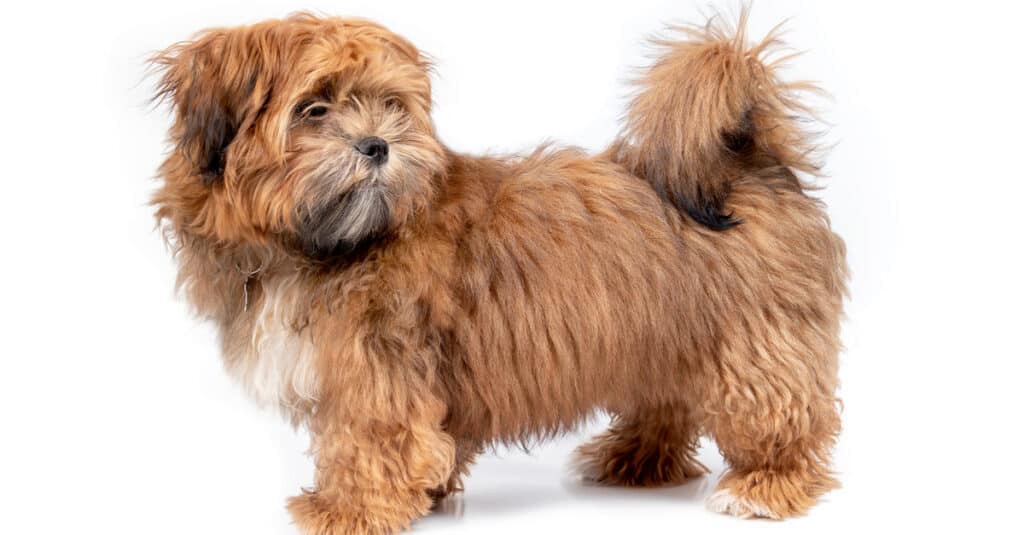
A Zuchon gets along well with everyone, even other dogs and cats, because it has a happy and exuberant personality
©sophiecat/Shutterstock.com
One trait breeders aim for in a Zuchon is personality. These dogs are happy and exuberant, always thrilled to see you, and they never meet a stranger. You can help maintain this winning disposition by socializing the pup around strangers and pets. At home, your Zuchon pup will get along well with everyone who lives there, although it may develop a favorite person, but it will coexist peacefully with other dogs and cats.
Best Dog Food
As a small breed, Zuchon dogs need to be watched carefully to avoid obesity. It is much easier to help it maintain a healthy weight than to lose weight. Even though it doesn’t need much food, breaking its meal into two servings each day gives it something to look forward to and helps discourage it from eating too quickly.
Cushing’s is an unfortunate condition in Zuchons, and it usually originates from a pituitary or adrenal gland tumor. So Zuchon owners should be especially careful about any unnatural additives in dog food.
To keep a Zuchon’s hormones, gut, and skin well-balanced, at A-Z Animals we believe Hill’s Science Diet Dry Dog Food, Adult Small & Mini Breeds, Sensitive Stomach & Skin Chicken Recipe is a great option.
The natural ingredients in this food won’t disrupt your Zuchon’s microbiome. Also, the recipe is specifically formulated for small dogs and has Omega-6 fatty acids and Vitamin E for optimum skin and coat health.
You can find Hill’s for Adult Small and Mini Breeds, Sensitive Stomach and Skin on Chewy and Amazon.
- Formulated for small dog's microbiome for optimal digestive health
- Vitamin E, omega 6 fatty acids and other nutrients for healthy skin & coat
- Made with natural ingredients
- Veterinarian recommended
Maintenance And Grooming

Zuchons don’t shed but still need regular grooming to keep the coat nice.
©sophiecat/Shutterstock.com
The Zuchon, as a breed, has a hypoallergenic coat. It comes in a range of colors, including black, red, fawn, white, and cream. The color can be solid or particolored, and the fur may be silky or curly.
The Zuchon is a non-shedding breed, but that doesn’t mean its coat is maintenance-free. Regular grooming is necessary, not only to keep his coat looking nice, but also to prevent mats that can become painful if left. Going over your pup with a comb each day takes only a few minutes and eliminates the need for marathon sessions later on.
Along with regular coat maintenance, use a cotton ball dampened with ear cleaning solution once a week and trim his nails at least once a month. Depending on how the hair on his face grows, he may benefit from having the area around his eyes trimmed to make it easier to see and keep him more comfortable. Dental issues will increase with age, so brushing its teeth a few times a week is recommended to avoid problems later on.
Training
A Zuchon’s eagerness to please makes it easy to train. It is never too late to train your full-grown dog, but starting as soon as you bring your puppy home helps it quickly integrate into the household. In addition to basic commands, training your puppy not to jump on people or on furniture is much quicker when the dog is young.
Crate training makes housebreaking much easier, and most pups take quickly to their crate. Having an area where you can put your pup and know that it is safe gives you peace of mind when it is young and you cannot keep your eye on the dog constantly.
Exercise
While active and playful, the Zuchon doesn’t need much exercise to stay healthy and happy. In fact, a few indoor play sessions each day provide the enrichment it needs. It is, however, a good idea to get it outside for even a short walk a few times each day to stretch its legs and get some fresh air. Keep in mind its size when walking the dog or it may have trouble keeping up if your outing is too long.
Puppies
The average litter size for Zuhcons is four to five puppies. Breeders can cross a Shih Tzu and Bichon Frise or two Zuchons to produce the breed.
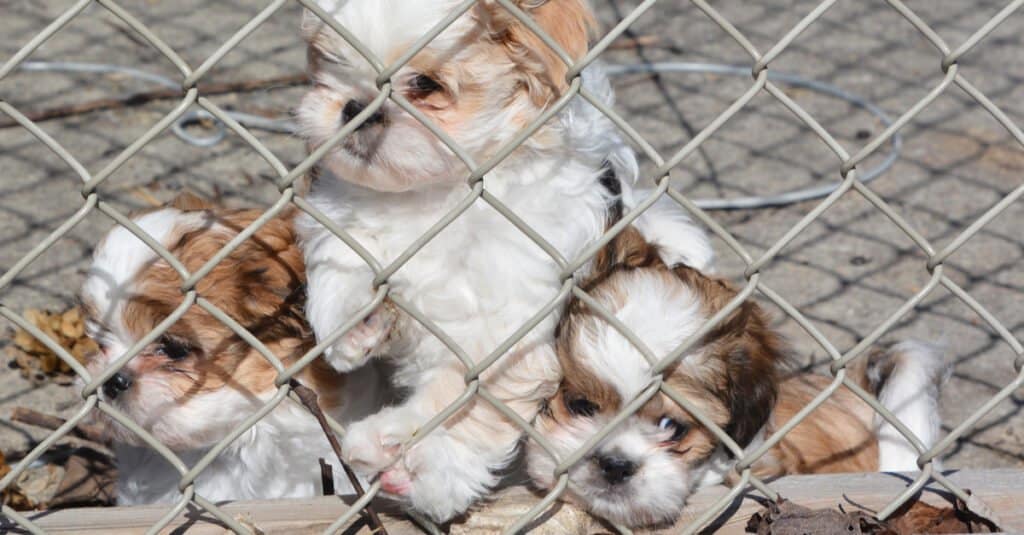
©meunierd/Shutterstock.com
Children
The breed’s buoyant personality and love of people make it a good match for families with children; however, it is important that the children and puppies, and even full-grown dogs. are closely supervised. Zuchons are small and cannot tolerate rough handling. Their love of people may prevent them from retreating when overwhelmed, so it is up to the adults to manage and supervise play.
Similar Dogs
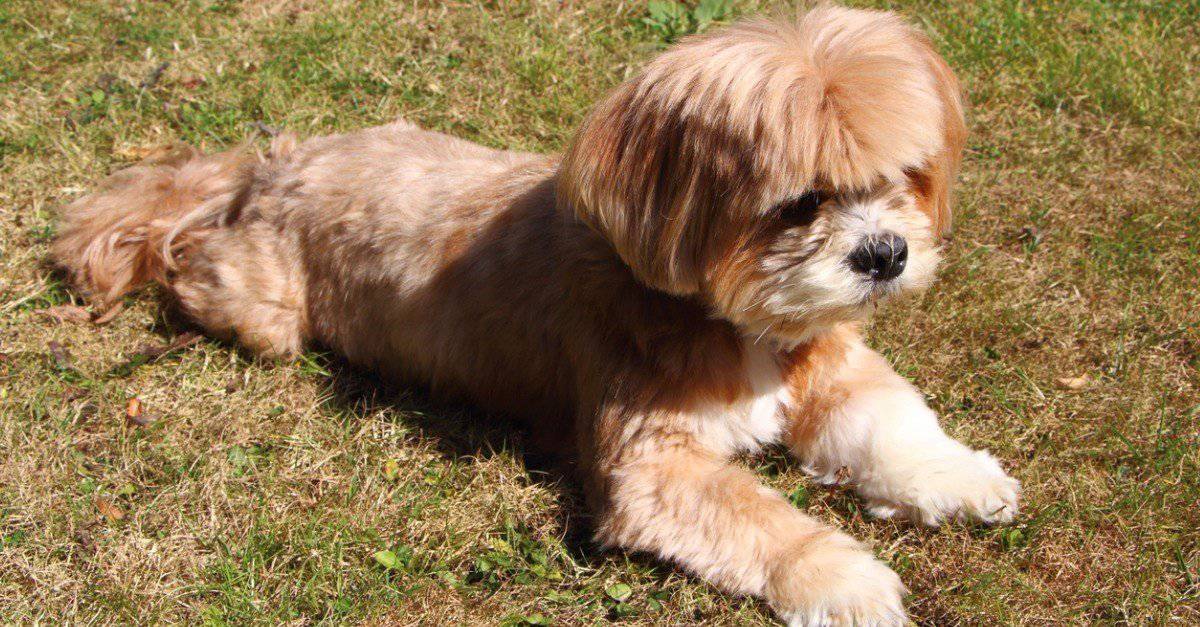
The Lhasa Apson is a dog similar to the Zuchon in personality and size.
©iStock.com/oceane2508
There are other choices of toy dogs with similar temperaments and personalities. The obvious choice is one of the two breeds that breeders use to make up the Zuchon: the Shih Tzu or the Bichon Frise. There are other choices too, of course:
- Lhasa Apso– Friendly, affectionate, and long-lived. The breed does have a tendency to bark, making it an excellent watchdog.
- Maltese– Happy and generally healthy, the breed is also hypoallergenic.
- Pomeranian– Smart and low exercise needs. Not the best choice for families with children.
Popular Names
Popular names for Zuchons are the following:
- Charlie
- Teddy
- Buster
- Zoey
- Coco
- Bella
Zuchon FAQs (Frequently Asked Questions)
How much does a Zuchon cost to own?
The average price of a Zuchon puppy is between $650 and $1000, although you can find them priced as high as $2000. Aside from the initial purchase price, you will need to budget for annual veterinary checkups as well as one-time purchases such as a crate. As a small breed, the cost of feeding the Zuchon is very reasonable.
Is the Zuchon good with kids?
The breed’s happy-go-lucky personality makes him a willing companion for kids, however, as a small breed, it is important to supervise children while playing. Depending on the age of the child, an adult should constantly supervise, or, for older children, spend time explaining how to play with the pup and why it is important to avoid being too rough.
Also, the breed, while energetic, is small. He will use up energy playing and may need to be encouraged to take a break when playing with family.
How long do Zuchons live?
The average lifespan of the Zuchon is between 15 and 18 years. The long lifespan of the breed making it particularly important to practice preventative dental and medical care so that he stays healthy for as long as possible.
What is a Zuchon?
A Zuchon is a cross between a Shih Tzu and a Bichon Frise. The name indicates that the breed is a direct cross between the two breeds, but that isn’t always the case. While a Shih Tzu and Bichon Frise cross is called a Zuchon, two Zuchons can be bred together. The resulting pups are also known as Zuchons. Generally, the puppies from the Zuchon couplings are more consistent in appearance than when breeding Shih Tzu and Bichon Frise crosses.
Are Zuchons good dogs?
The teddy bear dog, as he is often called, is a wonderful companion. While he isn’t the best fit for an active family, he is always ready to play. He is also content to curl up beside you on the couch.
One area where the Zuchon can be difficult is in housetraining. Like the Bichon Frise, the breed can be a challenge to housetrain. Crate training and adhering to a strict schedule for meals and exercise can make the process more pleasant. It is important to exercise patience when housetraining the breed. Set him up for success with frequent potty breaks and watching him closely when he is out of his crate.
How much does a Zuchon cost?
The average price of a puppy is between $650 and $1000.
Are Zuchons smart?
The breed is intelligent, although not as smart as some other breeds. This doesn’t make him less of a companion, however, and people often find that smarter pups spend time trying to outthink their owners. The Zuchon has a winning combination of being both smart and eager to please, which makes him easy to train. He can be stubborn, which should not be mistaken for a lack of intelligence. Keeping training sessions short and fun is the best way to train the Zuchon.
Can the Zuchon be left alone?
Although they enjoy company, they can be left alone as well. Unlike some other small breeds, the Zuchon is not prone to separation anxiety. However, any dog left alone will get anxious. Leaving a radio or television on at low volume helps muffle outside noises that may make your pup anxious and also provides soothing white noise.
What clubs recognize Zuchon pups?
The Zuchon is recognized by the Designer Dogs Kennel Club and the American Canine Hybrid Club. It is not a recognized American Kennel Club breed.
What color parents do black Zuchons come from?
While white is the most common color of Zuchons, black is the rarest. The Shih Szu can be black, however, it isn’t common. The Bichon Frise can be white or white with cream, apricot, or buff. A solid black Zuchon takes selective breeding, typically over generations. Breeding two black or particolored with black Zuchons gives the highest likelihood of solid black offspring.
Thank you for reading! Have some feedback for us? Contact the AZ Animals editorial team.
Sources
- US Service Animals, Available here: https://usserviceanimals.org/blog/zuchon-breed-overview/

